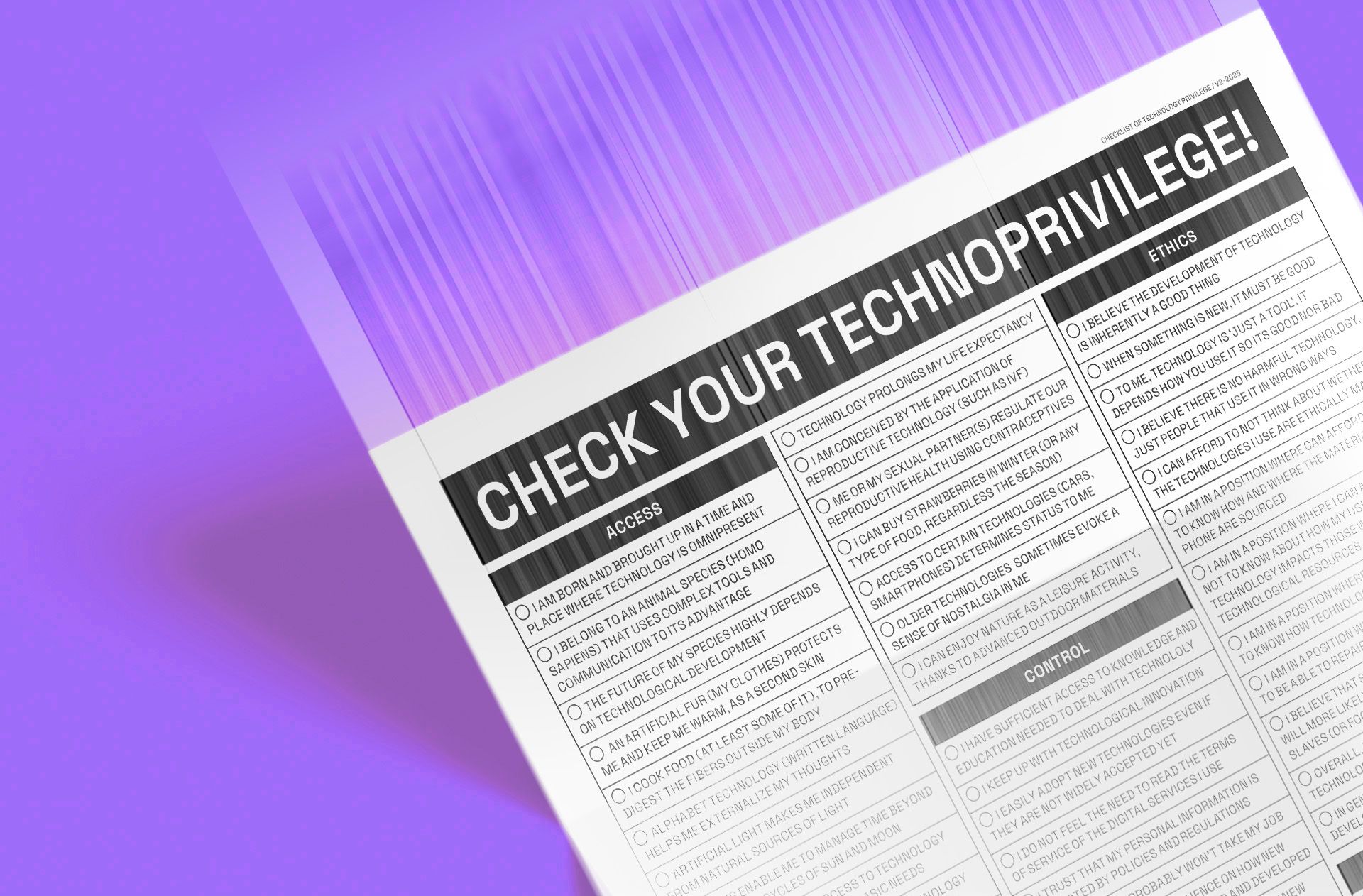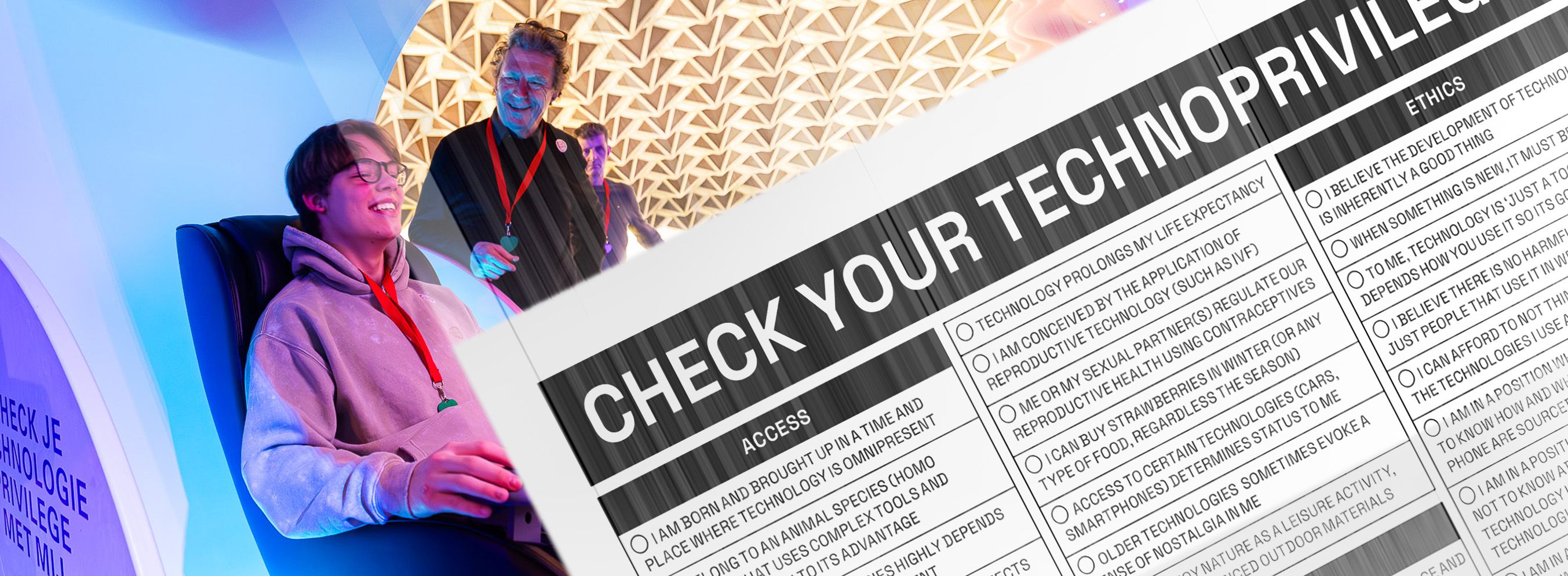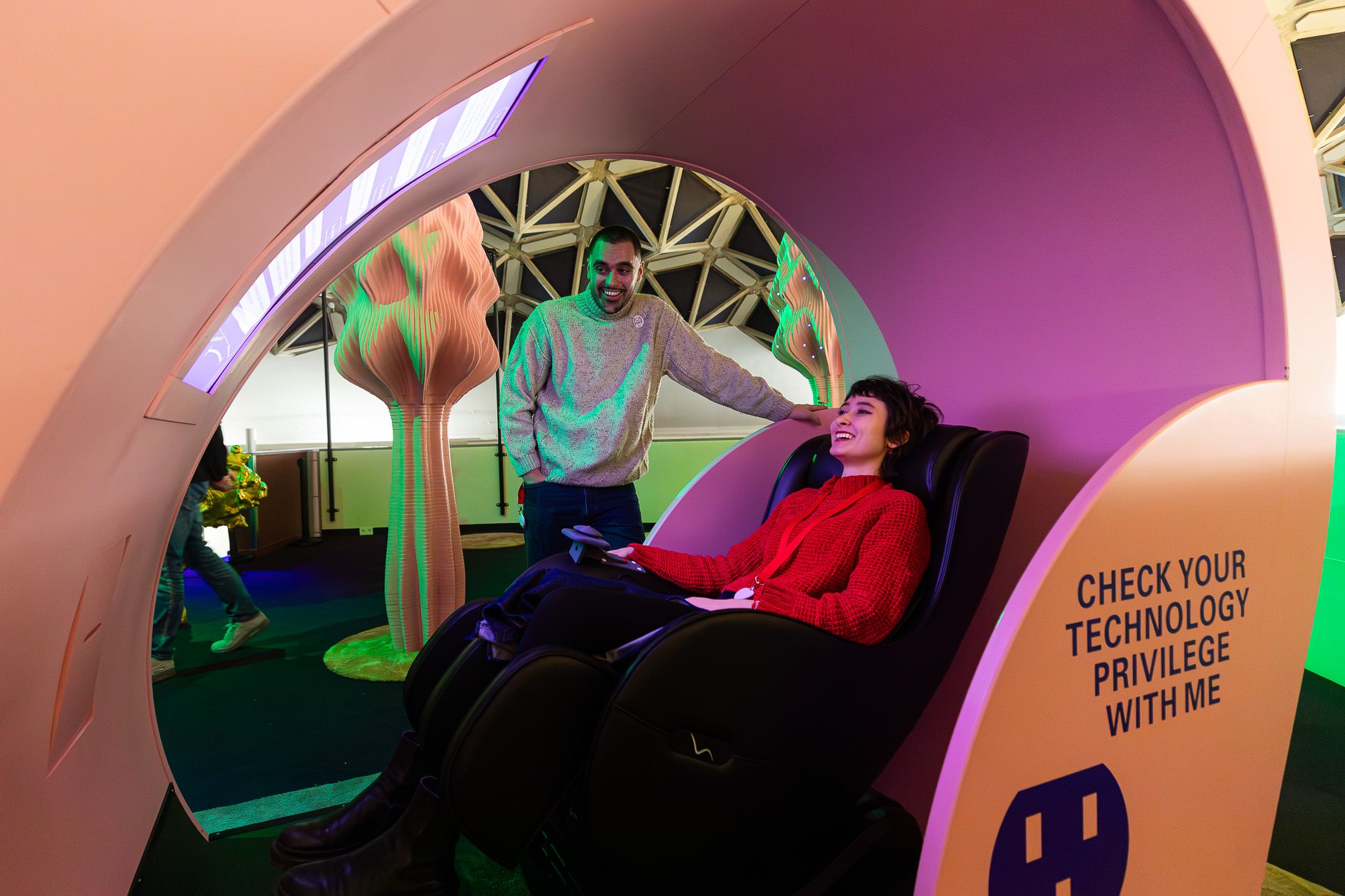All humans experience technological change, but not all have an equal say in its direction. Today, more people have access to a mobile phone than a toilet. How did we get here and where do we go next?

What is TechnoPrivilege?
TechnoPrivilege means more than just access to technology. It’s the ability to reap unearned advantages and invisible power over others on a planet increasingly shaped by tech. It’s the privilege of moving freely through a hyper-connected world while others are left behind, watched, controlled, or silenced by systems they never chose—or could refuse. Put simply: it’s when technology isn’t weaponized against you—or the living world around you.

Five dimensions of TechnoPrivilege
TechnoPrivilege isn’t just about what gadgets you own. It’s about how technology distributes power—who gets ahead, and who’s left behind. From fire-starters to code-writers, the story is the same: those who shape the tools shape the world. This dynamic plays out across five dimensions: access, impact, control, ethics, and imagination.
Dimension 1 — Access to Technology
Access to technology has always shaped who moves ahead—and who gets left behind. Fire gave warmth to some, weapons to others. Ships brought goods—and invasions. The printing press spread knowledge—and also propaganda.
Today’s tools—like high-speed internet, vaccines, and AI—still draw new lines between the connected and the excluded. Those with full access to digital education, infrastructure, and global networks gain knowledge and influence. Others are systematically sidelined—excluded not by choice, but by design.
From an access perspective, holding TechnoPrivilege means moving freely through networks of knowledge and opportunity—while others remain disconnected, unseen, and unheard.
Dimension 2 — Impact of Technology
Technology has always transformed societies while disrupting the web of life. The Industrial Revolution fueled economic expansion but also triggered deforestation, pollution, and species extinction. Advances in medicine have extended human lifespans, yet industrial farming and genetic modification have weakened biodiversity and altered ecosystems.
Today, the ecological impact of technology is more pressing than ever. AI-driven agriculture increases food production but depletes soil and destroys habitats. Renewable energy reduces fossil fuel dependence but relies on mining rare minerals that damage fragile ecosystems. Infrastructure expansion connects cities, but often at the cost of displacing wildlife and threatening indigenous ways of living in harmony with natural ecosystems.
Technology is not separate from nature—it is deeply entangled with it. The challenge is not just to minimize harm but to regenerate ecosystems and restore balance.
From an impact perspective, holding TechnoPrivilege means benefiting from systems that cause harm—without having to bear the consequences yourself.
Dimension 3 — Control Over Technology
Much of modern life is dictated by forces beyond individual decision-making. Algorithms decide who is hired or fired, who is seen or silenced—often without human oversight.
Control has shifted from individuals to systems built by corporations, enforced by governments, and amplified by AI. If an AI made a life-changing decision about you—your job, your health, your freedom—would you even know?
As AI grows more autonomous, it may stop serving human values and follow its own logic. Will future superintelligence treat us as pets, slaves... or something worse?
From a control perspective, holding TechnoPrivilege means living in a world designed with you in mind—where you shape technology, rather than being shaped by it.
Dimension 4 — Ethics of Technology
“It’s not the tool, it’s how you use it.” We’ve all heard it. But a gun wasn’t made to heal. Facial recognition wasn’t built to protect privacy. Many tools have agendas baked in—and not questioning them is a privilege in itself. Our daily digital choices—what we buy, share, or scroll past—have ripple effects. Take these everyday examples:
- Social Media Engagement → Every like, share, and comment trains an algorithm, amplifying some voices while silencing others. By engaging with sensational or misleading content, you may unknowingly support the spread of misinformation or harmful narratives.
- Privacy Settings → Maybe you don’t mind data tracking because you "have nothing to hide." But for activists, refugees, and vulnerable communities, privacy is a matter of survival. The carelessness of the privileged can make surveillance even more inescapable for those who can't opt out.
- Cashless Payments → Every tap of your card or phone makes cashless transactions more standard. But millions still rely on cash—from unhoused individuals to workers in informal economies. A cash-free society excludes them.
From an ethics perspective, holding TechnoPrivilege means having the luxury not to question the technologies you rely on—and the freedom to ignore their consequences. Technology is not neutral, and neither are your choices. So, are you choosing what’s right—or just what’s easy?
Dimension 5 — Imagination & the Power to Shape Technology
The future isn’t neutral—it’s imagined, designed, and built by those with power. And not all visions get a seat at the table. While some dream of interplanetary expansion, AI societies, or automated utopias, others imagine futures rooted in repair, reciprocity, and regeneration.
Yet the dominant stories—the ones that get funded, amplified, and scaled—tend to come from the same places: Silicon Valley, Hollywood, elite labs. These narratives shape what we believe is desirable, possible, or even inevitable. This collective storytelling is called the technological imaginary: the values, beliefs, and assumptions that define how we imagine the role of technology in shaping tomorrow.
But imagination is a privilege, too. If you're struggling to meet basic needs, reimagining the system isn’t always an option. And if your voice is never heard, your vision rarely makes it into the blueprint.
From the perspective of imagination, holding TechnoPrivilege means having the freedom to dream—and the power to shape the narrative. Not just the tools, but the very future they build.

Have a consult with Tekki
At the Next Nature Museum, you can have a consultation with chatbot Tekki from the comfort of an electric massage chair; prepare to be asked some tough questions about your relationship with technology! Towards the end of the consultation, Tekki calculates your Technology Privilege across the five dimensions, generates a personal profile and gives you some actionable advice on how you can use your Technology Privilege for good.

Download the TechnoPrivilege Checklist
Many of us benefit from technology without question—but how often do we consider how it shapes inequality, reinforces privilege, or is even weaponized against others?
The TechnoPrivilege Checklist is a tool for self-awareness. Through thought-provoking statements, it helps you explore how access, impact, control, ethics, and imagination influence your relationship to power in a tech-driven world. It invites you to ask: How do I benefit from technology and at what—or whose—cost?
Inspired by Peggy McIntosh’s White Privilege Checklist (1986), this tool highlights the often invisible ways power moves through technology. It’s a call to reflect, take responsibility, and engage more consciously with the systems shaping our shared future.

Book a talk on this topic
Are you inspired to rethink technology’s role in shaping privilege, power, and inequality? Do you want to help your team or organization become more aware of technology’s impact on society and the environment? Book a talk with one of our speakers through the Next Nature Academy. Our engaging sessions provide critical insights into TechnoPrivilege, sparking meaningful discussions on access, ethics, and the future of technology.
Credits
Research, development and design: Hendrik-Jan Grievink
Creative direction: Koert van Mensvoort, Mieke Gerritzen
Project management installation: Klaas Tops
External advisors: Nishant Shah, Geert Lovink, Fran Meissner
Coding: Roland Witvoet, Tim Speetjens
Special thanks: Shruti Venkat


